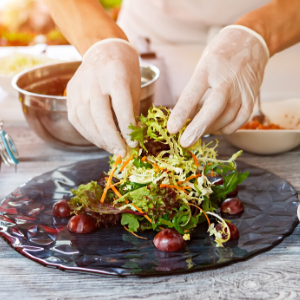While it might be difficult to look ahead and predict what will happen next with COVID-19, it would be
wise to start thinking about how the outbreak is going to influence the restaurant industry once it’s
over. Customers will at first be apprehensive about eating in restaurant dining areas which means
restaurants will have to work hard to regain their trust.
In order to do this, restaurant owners have to reevaluate their safe food handling and sanitation practices. Because of the strong emphasis on the use of cleanliness to combat this virus, customers will take a restaurant’s reputation for cleanliness into consideration when selecting a restaurant to dine in. Read through our list of safe food handling and sanitation practices that are likely to stay after the pandemic is over.
Food Handling
When it comes to food handling, stricter regulations will be implemented upon employees in order to have adequate coronavirus prevention. They will be expected to practice enhanced personal hygiene during and after service hours. While you might not be able to control how employees act at home, you can require them to practice the following regulations.
Instruct Sick Employees To Stay Home
Currently, many employers are taking the temperature of their workers and instructing them to stay home if they feel ill. While this may not continue once the outbreak ceases, it’s likely that restaurant employees with a cough, runny nose, or other flu-like symptoms will be encouraged to stay home.
The simplest cough in public can create an awkward situation, especially if your staff members are handling food. Customers may suspect that your employees have some type of illness and it’s going to infect them. This is why it is important to be attentive to your staff’s well being, especially in the early post-coronavirus days.
Employees Should Wash Their Hands More Often
While customers already know employees are required to wash their hands after using the restroom and before handling food items, they will now be expecting it to happen more often. A person can get sick by shaking hands with an ill person and then touching their own face. Customers want to know that everything is being done to minimize the spread of germs in the front and back of the house. That is why you should have your staff members wash their hands before handling food, before and after eating, after they’ve removed gloves, and after every time they touch high-contact surfaces in addition to washing after using the restroom.
Employees Should Wear Face Masks

Viruses can spread from respiratory droplets released through the mouth and nose. When you cough or sneeze, these droplets can contaminate countertops, plates, or other shared surfaces and cause customers to get sick. Having your servers and cooks wear masks while handling food and serving customers will minimize the spread of harmful bacteria and show customers that you care about their safety. You should strongly consider having both the front and back of house employees wear masks, especially if the kitchen is visible to your customers.
Sanitation Practices
While keeping everything sanitized has always been important in the foodservice industry, what will change is how often surfaces and equipment will get sanitized. Pay special attention to high-contact surfaces, such as:
- Doorknobs
- Countertops
- Dining tables
- Menus
- Utensils
- Cash registers
- Work stations
How Often Should I Clean High-Contact Surfaces?
Depending on the surface, they should be cleaned after every use or every hour. For example, cash registers and folded menus will be used by customers and employees alike. No matter how slow or busy your day is, there is always time to wipe down equipment and surfaces to keep your establishment clean.
What Types Of Cleaning Agents Should I Use To Sanitize Surfaces?
Always use EPA-registered disinfectants and sanitizers as these types of chemicals are not harmful to the health of employees and customers. If you are going to disinfect surfaces or items that come in contact with food, make sure to use food-safe cleaning agents. Consult the packaging of your cleaning products to determine if they are able to kill viruses.

Are These New Practices Really Here To Stay?
Since everyone is now more aware of personal hygiene and the cleanliness of their surroundings, it is highly probable that these new practices are here for the long term. As time goes on, these practices may loosen but restaurateurs should always have the highest standards when it comes to food handling and sanitation. By implementing these practices in your establishment, you’ll be able to build trust and loyalty with your customers in the near future.








